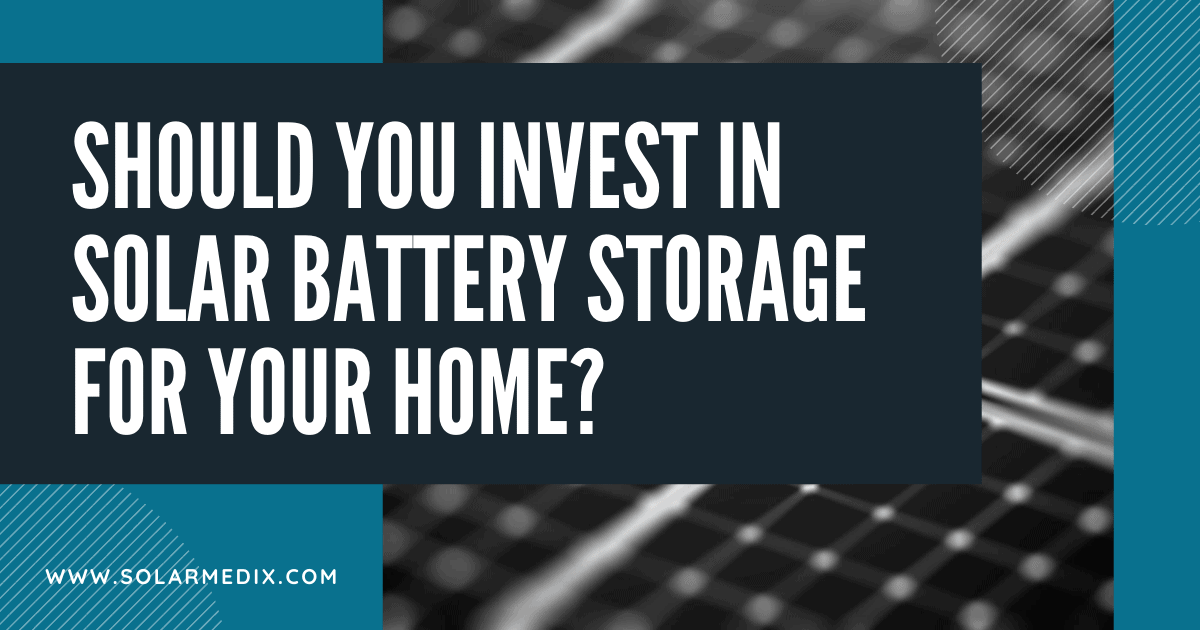For several years, home solar battery storage has been a hot topic in the solar world. If you are considering solar battery storage for your home, there are some things you can do to ensure that you get the most out of your system.
What to Consider When Investing in Solar Battery Storage for Your Home
If you are thinking of using solar batteries, you will come across a wide array of product specifications. The most important points to consider are capacity and power, the depth of discharge, the round-trip efficiency, and the battery life and warranty.
Power and Capacity
Capacity is the amount of energy that the battery unit can store. It is usually measured in kilowatt-hours (kWh). The power is the amount of power that a battery unit can deliver at any point in time, and it is measured in kilowatts (kW).
A battery with more capacity can store more energy, while a battery with a higher power rating can supply more power at any point in time. A simple analogy is thinking of energy capacity as the volume of water in a reservoir while the power is the size of the hose used to move water from the reservoir. A bigger hose will deliver more volume.
When you are planning to purchase solar battery storage, you should consider the amount of energy in kWh you want to store, as well as the amount of power in kW that you will need the unit to supply. Some battery units are designed to be modular, which means you can increase the capacity and power you need.
Depth of Discharge (DoD)
The DoD refers to the amount of capacity in a battery unit that can be used. To maintain a healthy battery life, solar batteries will hold on to some of the charge at all times, and they will not use 10% of their available energy.
Most battery makers will specify the maximum DoD for optimal performance. In general, a higher DoD means you will use more of the unit’s capacity. Some makers claim that their DoD is 100%. However, there will always be some residual capacity to ensure the battery’s health is not negatively affected.
Round-Trip Efficiency
When a battery stores the energy, some of the energy is lost. Round-trip efficiency refers to the amount of power you can draw from the unit in comparison to the amount of power that is fed into it while charging. In general, higher round-trip efficiency means that you will get more energy out of the battery unit.
Battery Warranty and Life
Most battery units are designed for daily cycling. While they might come with varying chemical properties and operational characteristics, they should provide the owners with reliable energy storage for a long time.
Each solar battery unit comes with a warranty that guarantees a given number of years of useful life. Many battery makers will also guarantee that the unit will keep a given amount of capacity over the life of the warranty. In general, the longer the warranty, the more protection you will get from the batteries.
Battery-Ready Options
A solar system with solar battery storage is the optimal way to use your solar energy. However, factors such as the amount of energy you consume and your unique situation could make it a huge initial investment. One way to get over this is to consider using a battery-ready system.
In theory, every solar system is battery-ready since you can always add a battery to the system. However, there are some key differences between the different types of solar systems.
Off-Grid Capabilities
Adding a battery to a solar system does not mean that it can be used entirely off-grid. Most battery units usually require grid support. If you want to install a system that will be completely off-grid in the future, you need to ensure that the solar system has this capability.
Hybrid Battery-Ready Systems
This particular system is called the hybrid system, or a plug and play system, which comes with a solar inverter that can convert DC power for the solar cells into AC power for the home. Without a battery, it works as a grid-tie system. However, it has technology baked into it that can charge and control the battery. A hybrid battery-ready system can also convert DC power from the battery unit into AC power for use in your home.
With this system, you can add batteries at any point in time without adding additional hardware to the system. Most hybrid inverters have the back-up function built into them, providing power to essential loads within the home in case the grid goes down.
With batteries, the hybrid inverter will only convert the amount of power consumed in the home to AC, allowing the rest of the power to go the battery in DC. The result is a better utilization of solar power generated from the solar array, which helps to improve the conversion efficiency.
AC-Coupled Battery-Ready Systems
This type of system is also called an “upgradeable system,” which requires an extra inverter for the battery beside the solar inverter within the existing solar system. In this system, the solar inverter will convert all solar power from DC to AC and deliver it to the house switchboard for use inside the home.
From there, the battery inverter can convert excess solar capacity from AC to DC so that it can be stored in the battery. Most AC-coupled systems require extra hardware to make it possible for the system to operate in a back-up capacity if the grid goes down.
Hybrid systems come with a higher initial cost than grid-tied systems. However, they should provide total system saving when you install the battery unit. The built-in hybrid function of the hybrid inverters also provides better control over the entire system when the battery unit is added.
When using an AC-coupled battery-ready system, you will pay less for the solar unit but will likely have to make an extra investment when adding the battery unit. Depending on the type of battery you use, there may be more flexibility in picking the battery separate from the solar system. However, you must choose a battery unit that is compatible with AC-coupled solar systems.
In conclusion, solar batteries will help to increase the functionality of your solar system. However, you should consider your power consumption levels, patterns, budget, and future expansion capabilities before investing in solar battery storage for your home













